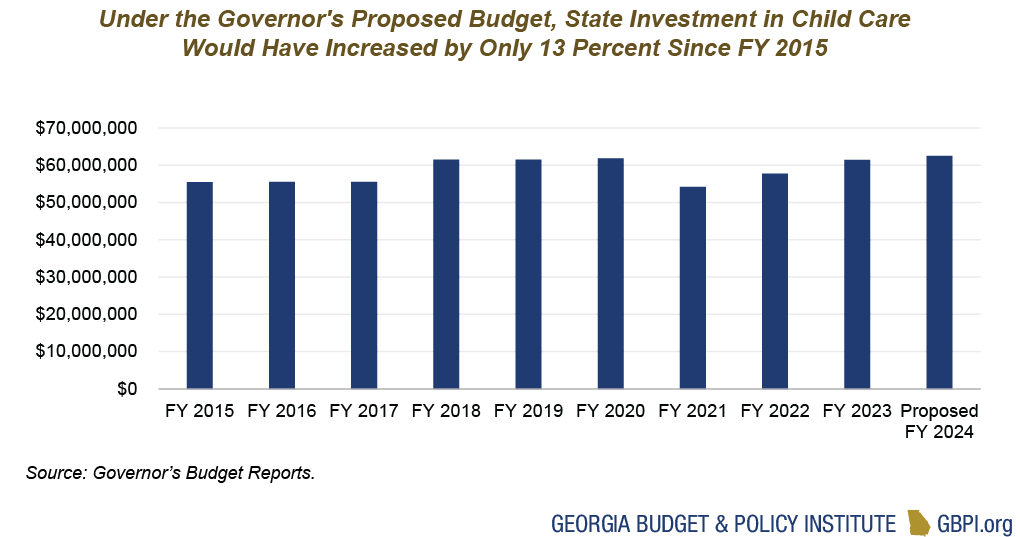The Department of Early Care and Learning (DECAL) administers the Pre-Kindergarten Program, Child Care Services, Nutrition Services and Quality Initiatives. State resources only support the pre-K program and Child Care Services. While the governor did not add resources in his proposed amended fiscal year budget for DECAL, he did propose $498 million for the agency for the Fiscal Year (FY) 2024 budget. It includes a marginal increase for Child Care Services and a $2,000 cost-of-living adjustment for state workers and pre-K lead and assistant teachers. The FY 2024 proposal would increase investment in the agency by about $36 million, or about eight percent, more than the approved FY 2023 budget.
Most of the recommended increases come from additional lottery funds to pay for a $2,000 bump in the base salary for pre-K and assistant teachers. If approved, these pay increases would be the second in two years.
2024 Fiscal Year Highlights
- $20.9 million for a $2,000 increase in state workers’ and pre-K teachers’ base salaries.
- $14 million for pre-K classroom operations so pre-K programs can redirect resources to increase lead teachers’ pay.
- $1 million in Child Care Services to adjust for the state match needed to draw down available federal Child Care and Development Funds.[1]
Georgia’s Assistant Pre-K Teachers Need Bigger Pay Increase
Despite $35 million in additional lottery funds to boost pre-K teacher pay, there is still a pay disparity between pre-K and kindergarten teachers. Kindergarten teacher base pay varies by school district, but the statewide salary average is about $65,000 annually.[2] Base pay for a pre-K lead teacher with just a bachelor’s degree is about $32,000 annually, while a certified pre-K teacher with a 4-year degree earns about $41,000 a year.[3] The base salary for a pre-K assistant teacher is $18,190, regardless of credentials; that’s about $8.75 an hour.[4]
The governor’s $2,000 pay increase will not increase pre-K assistant teacher earnings to a living wage. Currently, there are resources available to help close the pay gap, as Georgia has about $1.9 billion in lottery reserves, and only about $772 million is required in case of a shortfall in the net proceeds.[5] Policymakers could do more to support all pre-K teachers or focus on raising assistant pre-K teacher pay first as an initial step.
Child Care Gained Little Ground over the Past Decade
Georgia’s investment in its child care system is completely inadequate given the needs of families and child care providers. The state’s investment in Child Care Services has been minimal in the past several years. The increase in FY 2023 only replaced the cuts to the program during the height of the pandemic. If the legislature were to approve the governor’s proposal, the budget for Child Care Services would have increased by only about 13 percent since FY 2015.

Meanwhile, exhausted child care workers, who are disproportionately Black, continue to leave the field for higher paying opportunities.[6] At the same time, child care costs continue to grow.[7] This adds greater economic pressure on women, especially women of color, who tend to have lower incomes than their white counterparts. The pandemic has only made the crisis more acute and visible. Federal resources from the COVID relief packages have protected Georgia’s child care system from even greater harm. These resources will expire in fall 2024.
Meaningful investment in the child care system will take state and federal resources. However, the state does not have to wait on federal policymakers to start. Using the state $6.6 billion budget surplus, Georgia can, as it did last year with federal money, make additional $1000 bonus payments to child care staff who as a group of workers as a whole would not otherwise receive a pay increase this year. Such bonus payments would demonstrate child care staff are recognized like their peers who are pre-K teachers and would receive an increase this year under the Governor’s FY 2024 proposed budget.
Furthermore, the state can increase its funding to Child and Parents Scholarships (CAPS), the state’s child care assistance program, by adding more slots for children and increasing resources to license child care centers.
End Notes
[1] The Federal Medical Assistance Percentages or FMAP determines the amount of federal matching funds for state spending on certain social services.
[2] U.S. Bureau of Labor Statistics. (2022, March 31). May 2021 state occupational employment and wage estimates Georgia. https://www.bls.gov/oes/current/oes_ga.htm#25-0000.
[3] Department of Early Care and Learning. (2022). 2022-2023 Salary schedule for pre-K lead teachers. https://www.decal.ga.gov/documents/attachments/2023TeacherSchedule.pdf.
[4] Department of Early Care and Learning. (2022). 2022-2023 Georgia’s pre-K/per child estimate chart. https://www.decal.ga.gov/documents/attachments/2022-2023_RateChart.pdf.
[5] State Accounting Office. September 23, 2022. Georgia revenues and reserves report, fiscal year ended June 30, 2022. https://sao.georgia.gov/swar/grr.
[6] Georgia State University’s Andrew Young School of Policy Studies, the University of Georgia’s Carl Vinson Institute of Government and Bright from the Start, Department of Early Care and Learning. (2016, June). Economic impact of the early care and education industry in Georgia. https://www.decal.ga.gov/documents/attachments/EconImpactReport.pdf; Bipartisan Policy Center. (2021, August). National and state child care data overview. https://bipartisanpolicy.org/report/national-child-care/.
[7] Fillion, J. January 25, 2023. New BLS report finds price of child care “untenable for all families”. First Five Years Fund. https://www.ffyf.org/new-bls-report-finds-price-of-child-care-untenable-for-all-families/.










